HIPAA Vault’s Managed Google Cloud services provide public sector agencies with secure, HIPAA-compliant cloud solutions tailored to their unique needs. With advanced DevOps, cybersecurity measures, and proactive data protection, the solutions optimize operations, safeguard sensitive information, and ensure adherence to government standards. By leveraging Google Cloud’s scalability and reliability, organizations are empowered to achieve efficiency and compliance while focusing on their core mission.
HIPAA Linux
HIPAA Linux is a specialized Linux-based operating system designed to meet the security and compliance requirements of the Health Insurance Portability and Accountability Act (HIPAA). It incorporates robust encryption, access controls, and monitoring tools to safeguard protected health information (PHI). The system ensures data integrity and confidentiality by implementing strict compliance measures and continuous auditing capabilities. Its customizable nature allows healthcare organizations to adapt it to their specific operational needs while maintaining adherence to HIPAA regulations.
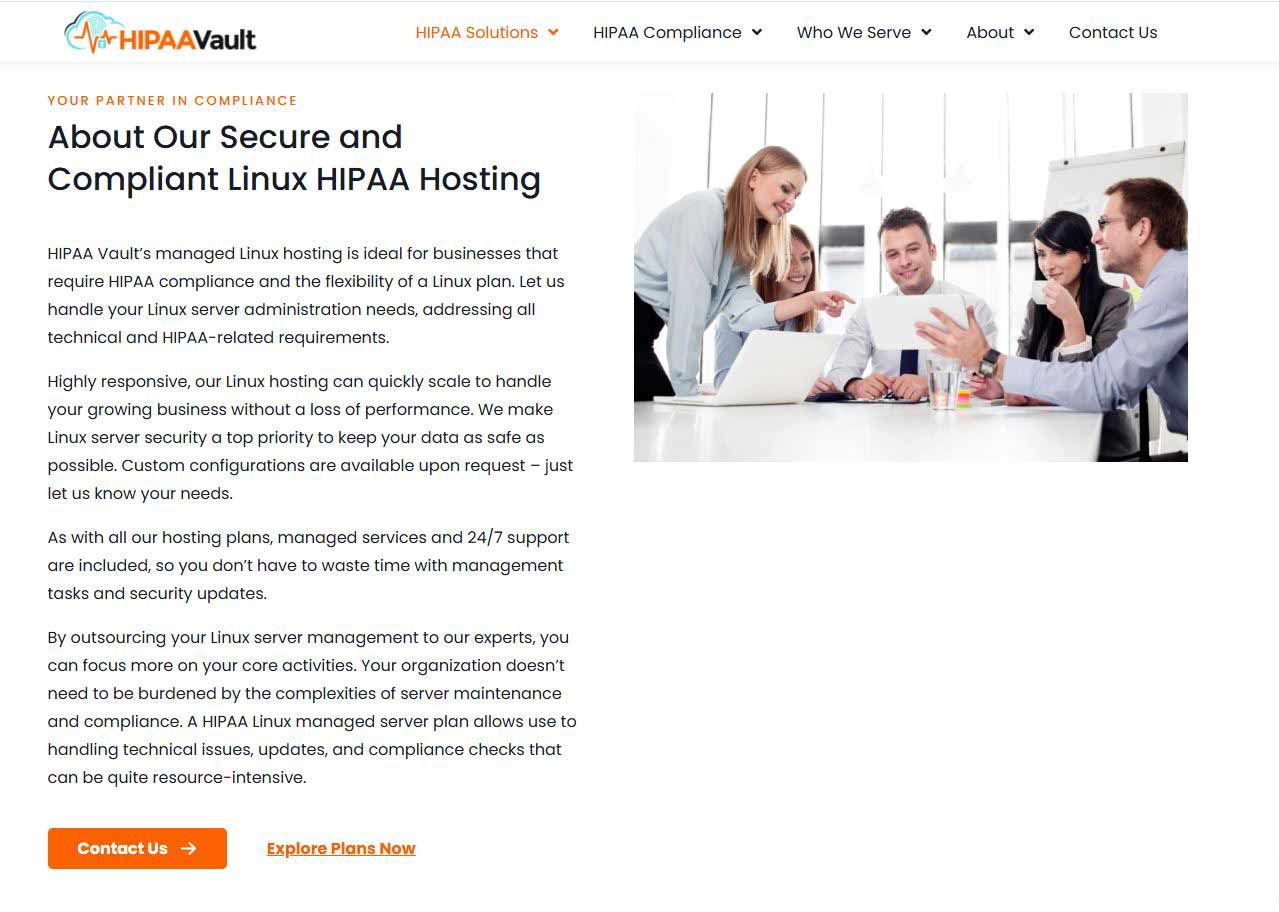

Summary of Benefits
- Enhanced Security: HIPAA Linux offers strong encryption and rigorous access controls, ensuring that sensitive patient data is protected from unauthorized access.
- Regulatory Compliance: Built-in tools for logging, monitoring, and auditing make it easier for healthcare organizations to meet HIPAA requirements.
- Cost-Effective Customization: As an open-source platform, it allows organizations to tailor the system to their needs without incurring high licensing fees, providing flexibility and scalability.
- Improved System Stability: Designed with healthcare in mind, HIPAA Linux ensures high reliability and uptime, minimizing disruptions to critical healthcare operations.
HIPAA Windows
HIPAA (Health Insurance Portability and Accountability Act) compliance for Windows refers to configuring and maintaining Windows operating systems to protect electronic Protected Health Information (ePHI). This includes implementing administrative, physical, and technical safeguards such as access controls, encryption, and auditing. Organizations must ensure that Windows devices are securely managed, updated, and monitored to meet HIPAA's stringent data protection requirements. Non-compliance can result in severe legal and financial penalties, emphasizing the need for robust security practices.
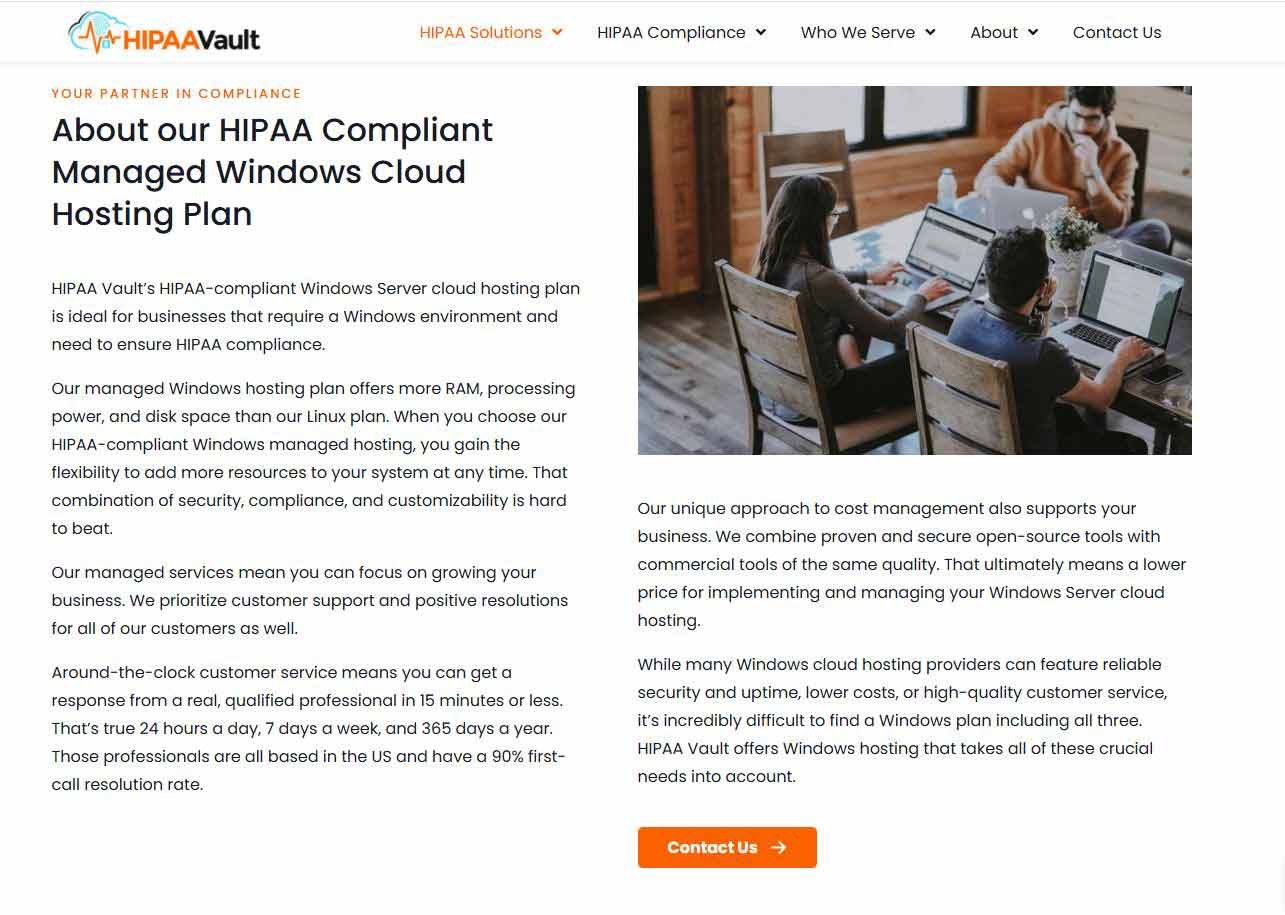

Summary of Benefits
- Enhanced Data Security: Protects sensitive ePHI from unauthorized access, breaches, and cyberattacks.
- Regulatory Compliance: Ensures adherence to HIPAA requirements, reducing the risk of penalties.
- Improved Trust: Demonstrates a commitment to patient privacy, fostering confidence among clients and partners.
- Operational Efficiency: Streamlined security protocols and centralized management reduce IT complexity and improve response times to security incidents.
HIPAA WordPress
HIPAA compliance for WordPress involves configuring the platform to safeguard electronic Protected Health Information (ePHI) when used for healthcare-related purposes. This requires implementing secure hosting, SSL encryption, user authentication, and activity logging to protect sensitive data. WordPress plugins and themes must also adhere to HIPAA standards, ensuring no vulnerabilities exist that could lead to data breaches. Organizations using WordPress for healthcare must continuously monitor and update their systems to remain compliant and secure.
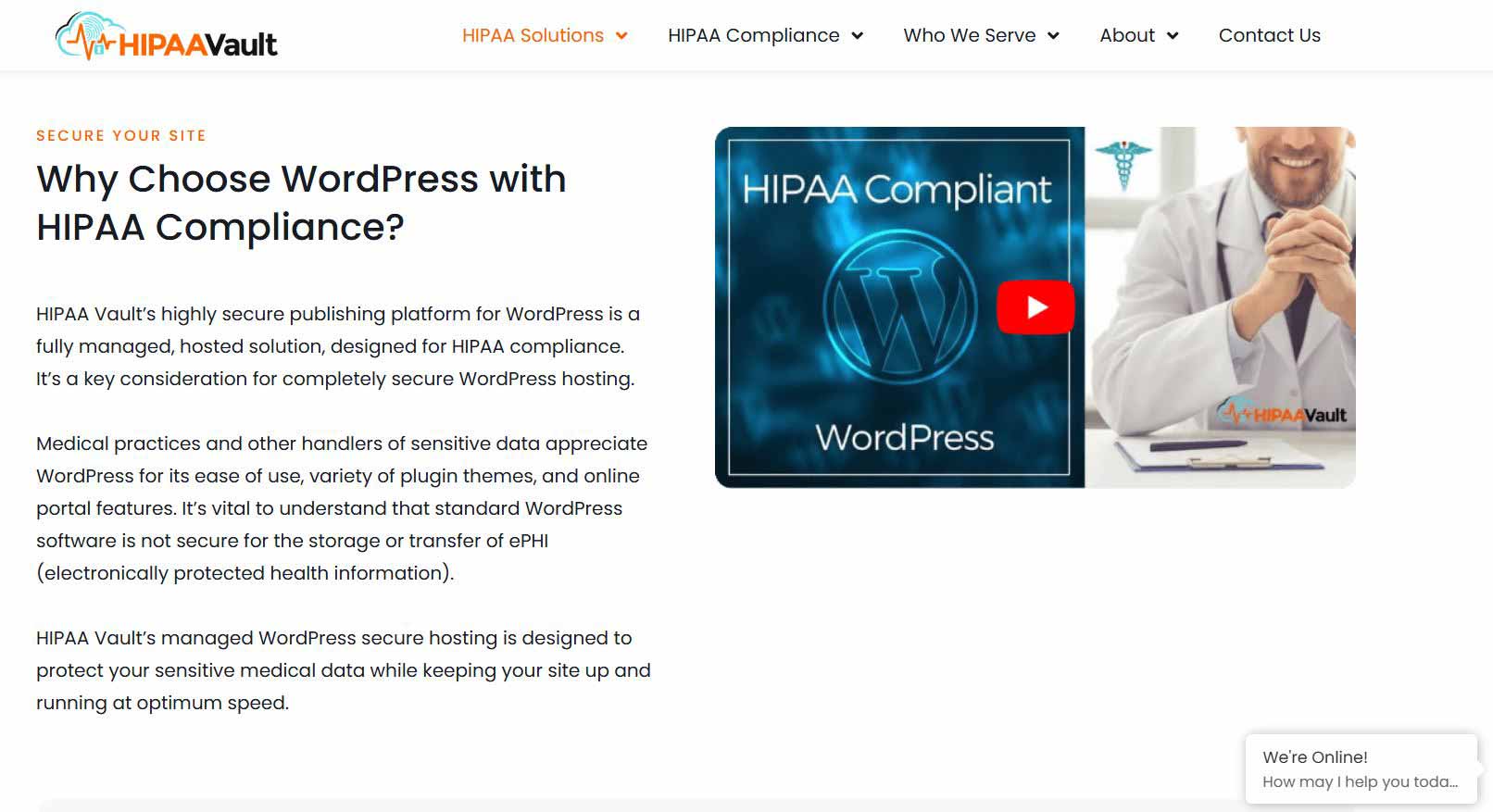

Summary of Benefits
- Secure Patient Data: Protects ePHI from unauthorized access, data leaks, and cyberattacks.
- Regulatory Compliance: Helps meet HIPAA requirements, avoiding costly fines and legal issues.
- Customizable Solutions: Offers the flexibility to create tailored, secure web solutions for healthcare needs.
- Enhanced Trust: Demonstrates a strong commitment to patient privacy, increasing client confidence and loyalty.
HIPAA WooCommerce
HIPAA compliance for WooCommerce involves configuring the platform to handle electronic Protected Health Information (ePHI) securely, especially when processing healthcare-related transactions. This includes implementing secure hosting, SSL encryption, user authentication, access controls, and monitoring to protect sensitive data. WooCommerce plugins, extensions, and customizations must be carefully selected and maintained to ensure they meet HIPAA security standards. Regular audits, updates, and data handling best practices are essential to maintain compliance and avoid breaches.
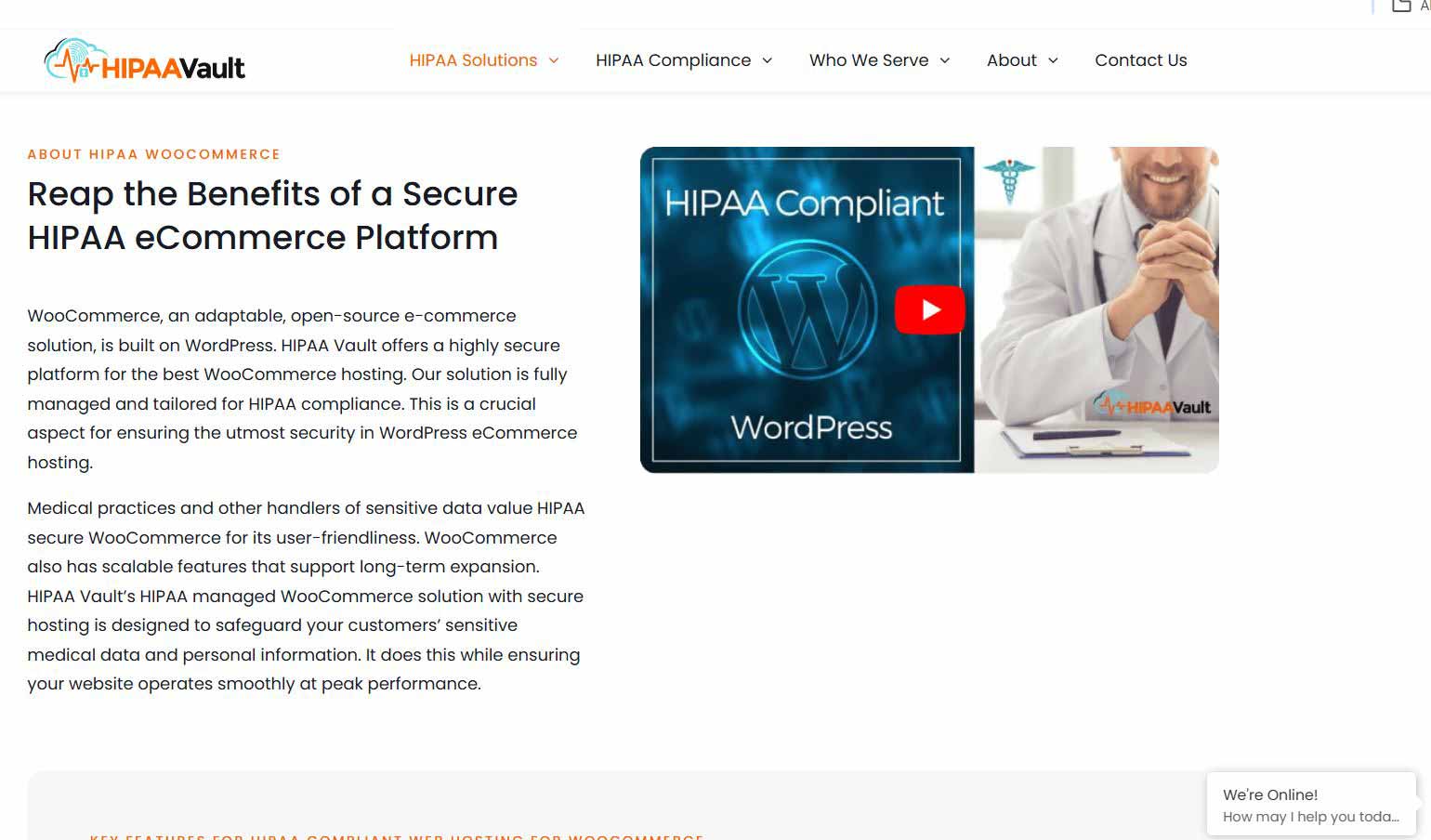

Summary of Benefits
- Secure Transactions: Ensures the protection of sensitive ePHI during online purchases and interactions.
- Regulatory Compliance: Meets HIPAA requirements, reducing the risk of financial penalties and legal consequences.
- Tailored E-Commerce Solutions: Allows the creation of secure, customized online stores for healthcare businesses.
- Increased Customer Trust: Builds confidence among patients and clients by prioritizing privacy and data security.
HIPAA Gmail
HIPAA compliance for Gmail requires configuring the email service to securely handle electronic Protected Health Information (ePHI). This includes using Google Workspace for Business, enabling advanced security features, and signing a Business Associate Agreement (BAA) with Google. Proper safeguards, such as encryption, secure access controls, and activity monitoring, must be in place to prevent unauthorized access to sensitive data. Organizations must also establish policies for using Gmail in compliance with HIPAA, including training users and monitoring for potential violations.
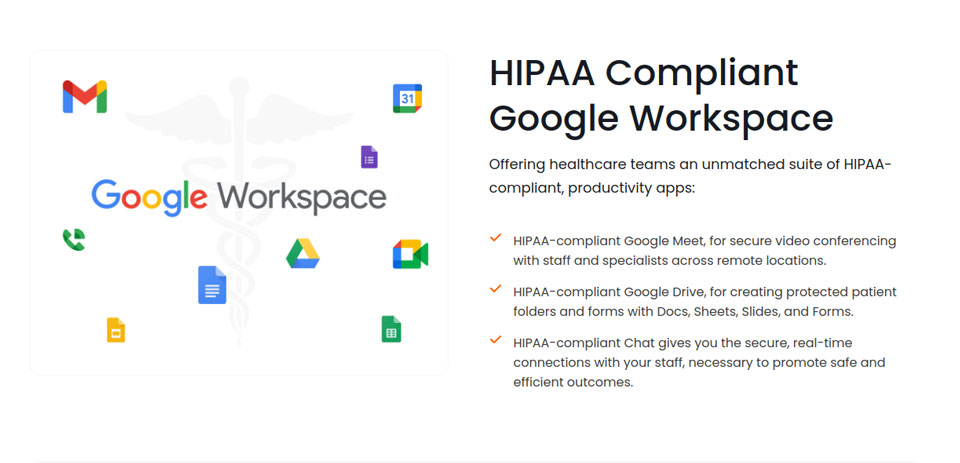

Summary of Benefits
- Secure Communication: Protects ePHI during email transmission and storage with encryption and security protocols.
- Regulatory Compliance: Aligns email practices with HIPAA requirements, avoiding legal and financial penalties.
- Enhanced Collaboration: Facilitates secure communication and file sharing within healthcare teams.
- Improved Trust: Demonstrates a commitment to protecting patient information, fostering confidence among patients and partners.
HIPAA sFTP
HIPAA compliance for Secure File Transfer Protocol (SFTP) involves using SFTP servers to securely transmit and store electronic Protected Health Information (ePHI). SFTP ensures data protection through encrypted connections, strong access controls, and activity logging to prevent unauthorized access and breaches. Organizations must configure SFTP environments to meet HIPAA's technical safeguards, including monitoring, user authentication, and secure backup practices. Regular audits and updates are necessary to maintain compliance and protect sensitive healthcare data.
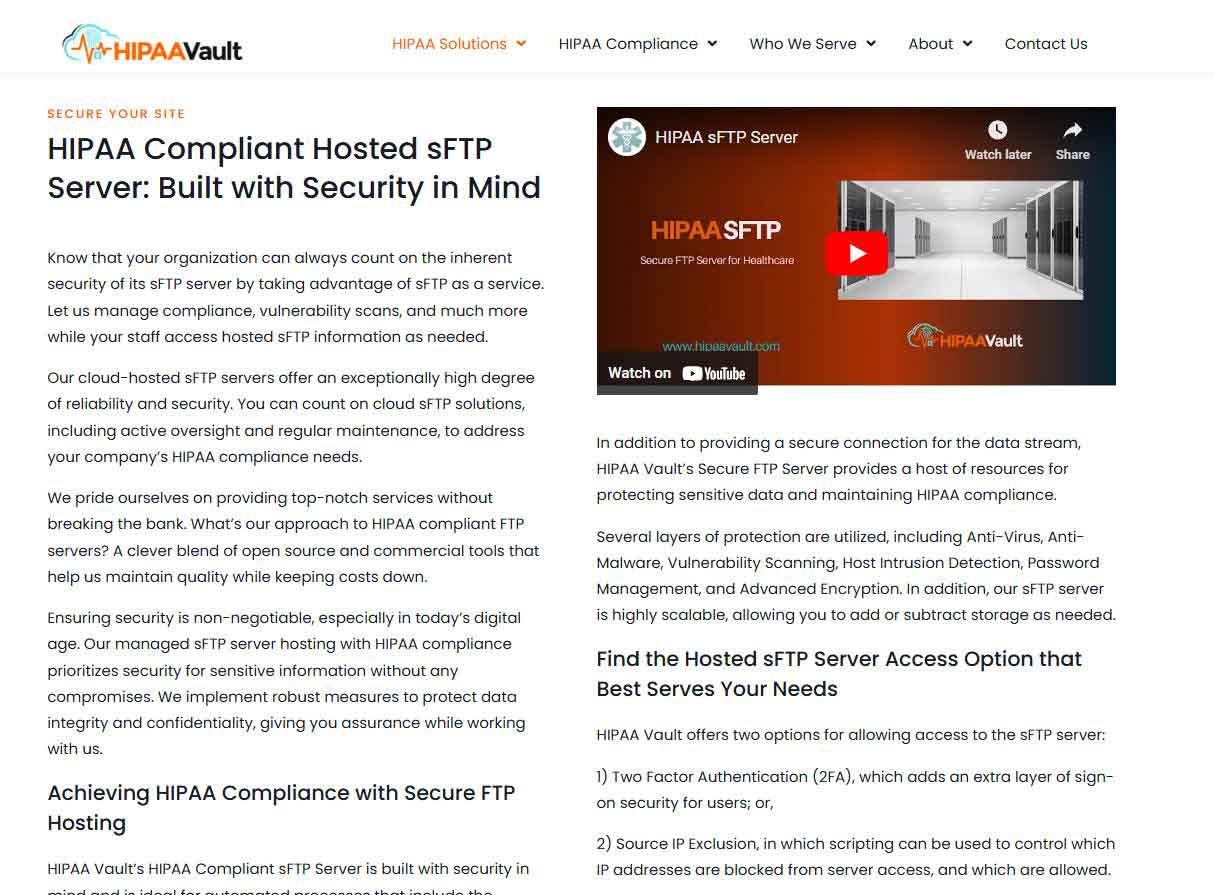

Summary of Benefits
- Secure Data Transfers: Provides encrypted, secure channels for transmitting ePHI, preventing unauthorized access.
- Regulatory Compliance: Meets HIPAA requirements for protecting sensitive data during transmission and storage.
- Reliable Storage Solutions: Offers a secure environment for storing ePHI with built-in redundancy and backup options.
- Increased Data Integrity: Ensures that sensitive healthcare data remains unaltered during transfer, maintaining its accuracy and reliability.
HIPPA Compliance as a Service
HIPAA Compliance as a Service provides businesses with tools, guidance, and support to meet the requirements of the Health Insurance Portability and Accountability Act (HIPAA). This service ensures the confidentiality, integrity, and availability of protected health information (PHI) by offering solutions like risk assessments, data encryption, secure communications, and employee training. By outsourcing HIPAA compliance, organizations can streamline their regulatory processes and focus on their core operations. It is commonly used by healthcare providers, business associates, and organizations handling PHI to mitigate risks and avoid penalties.
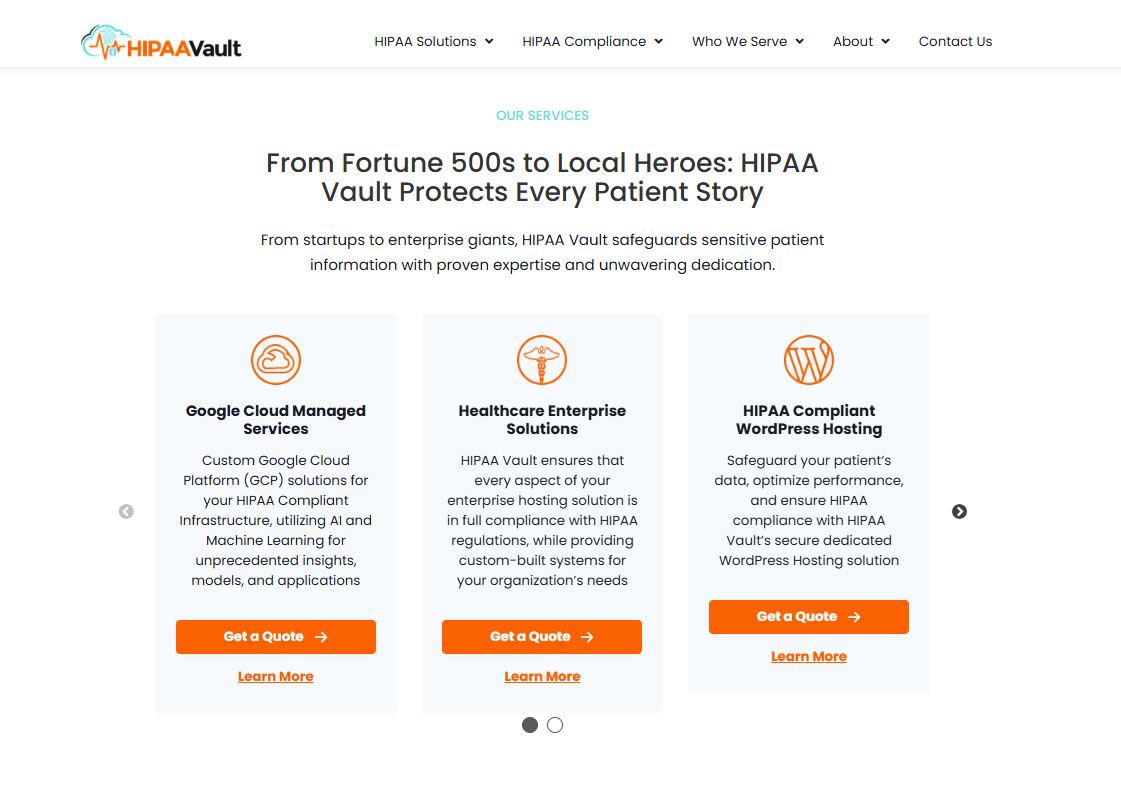

Summary of Benefits
- Enhanced Data Security: Ensures sensitive PHI is protected from breaches and unauthorized access.
- Regulatory Compliance: Simplifies adherence to complex HIPAA regulations, reducing the risk of fines and legal actions.
- Time and Cost Efficiency: Saves resources by outsourcing compliance processes to experts.
- Reputation Protection: Builds trust with clients and patients by demonstrating a commitment to safeguarding their data.
HIPAA Google Cloud Services
HIPAA Google Cloud Services provide secure, scalable, and compliant cloud solutions tailored for organizations managing protected health information (PHI). Google Cloud offers tools like secure data storage, encryption, access controls, and auditing capabilities to help businesses meet HIPAA requirements. With business associate agreements (BAAs) in place, it ensures a shared responsibility model for HIPAA compliance. Organizations can leverage Google Cloud's advanced technologies to process, store, and analyze PHI while maintaining strict security and privacy standards.
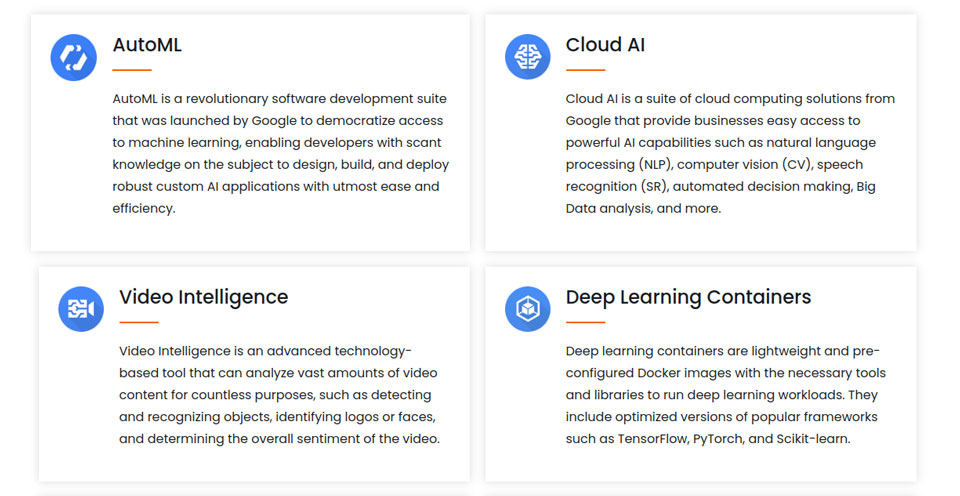

Summary of Benefits
- Scalability: Easily adjust resources to meet evolving business needs without compromising compliance.
- Built-in Security: Includes encryption, access control, and activity monitoring to protect PHI.
- Streamlined Compliance: Provides tools and documentation to simplify HIPAA compliance processes.
- Advanced Analytics: Enables secure use of machine learning and big data analytics for healthcare innovation.
HIPAA Fax
HIPAA Fax refers to the transmission of health information via fax while complying with the Health Insurance Portability and Accountability Act (HIPAA). HIPAA mandates safeguards to ensure the privacy and security of Protected Health Information (PHI) during its transmission. This includes measures like secure fax lines, recipient verification, and encryption to prevent unauthorized access or disclosure.
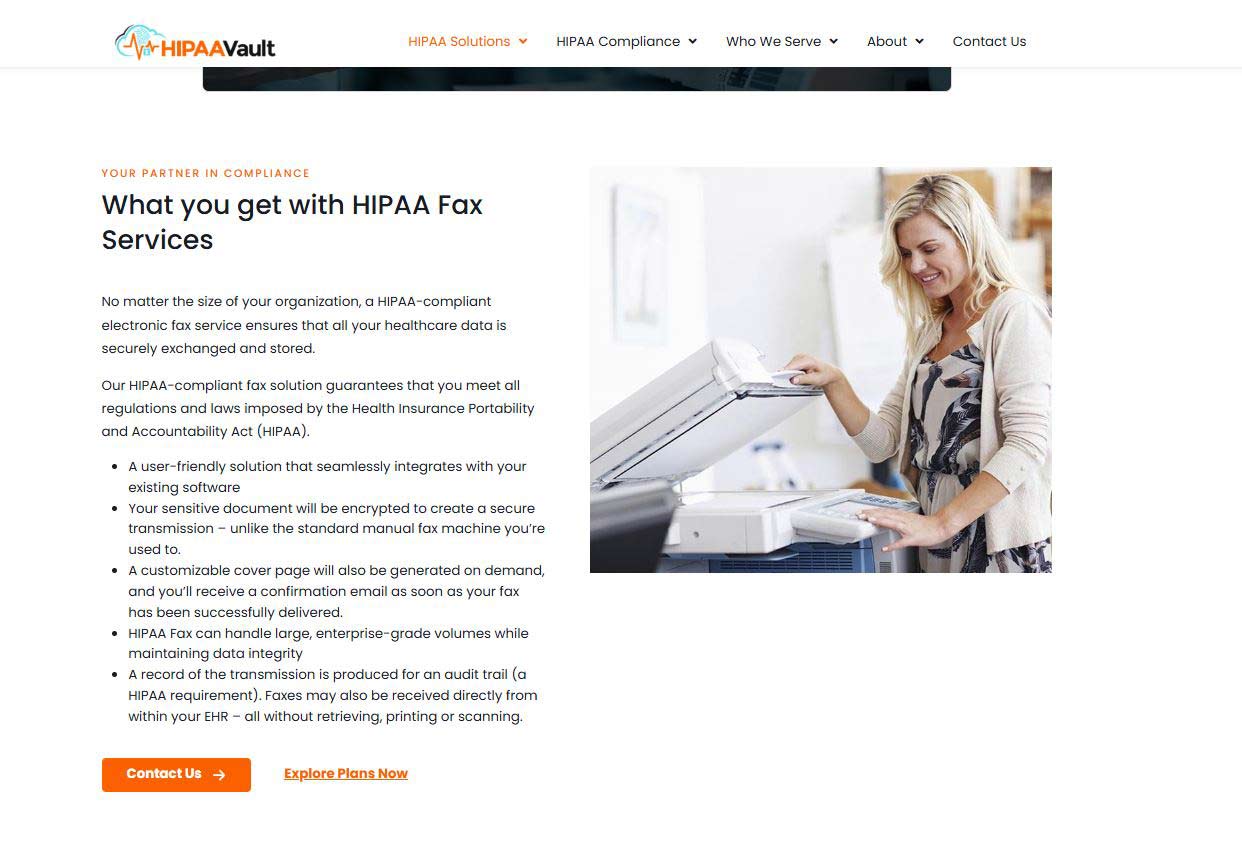

Summary of Benefits
- Enhanced Privacy Protection: Ensures that sensitive patient information is securely transmitted and only accessible to authorized individuals.
- Regulatory Compliance: Helps healthcare organizations avoid violations of HIPAA, reducing the risk of legal penalties and fines.
- Secure Data Transmission: Uses encryption and secure lines to safeguard PHI from interception or unauthorized access.
- Audit Trails and Documentation: Provides detailed records of transmissions, enhancing accountability and facilitating audits.
HIPAA Text
HIPAA Text refers to the secure exchange of health information via text messaging in compliance with the Health Insurance Portability and Accountability Act (HIPAA). It requires implementing safeguards such as encryption, access controls, and secure messaging platforms to protect Protected Health Information (PHI) during transmission and storage.
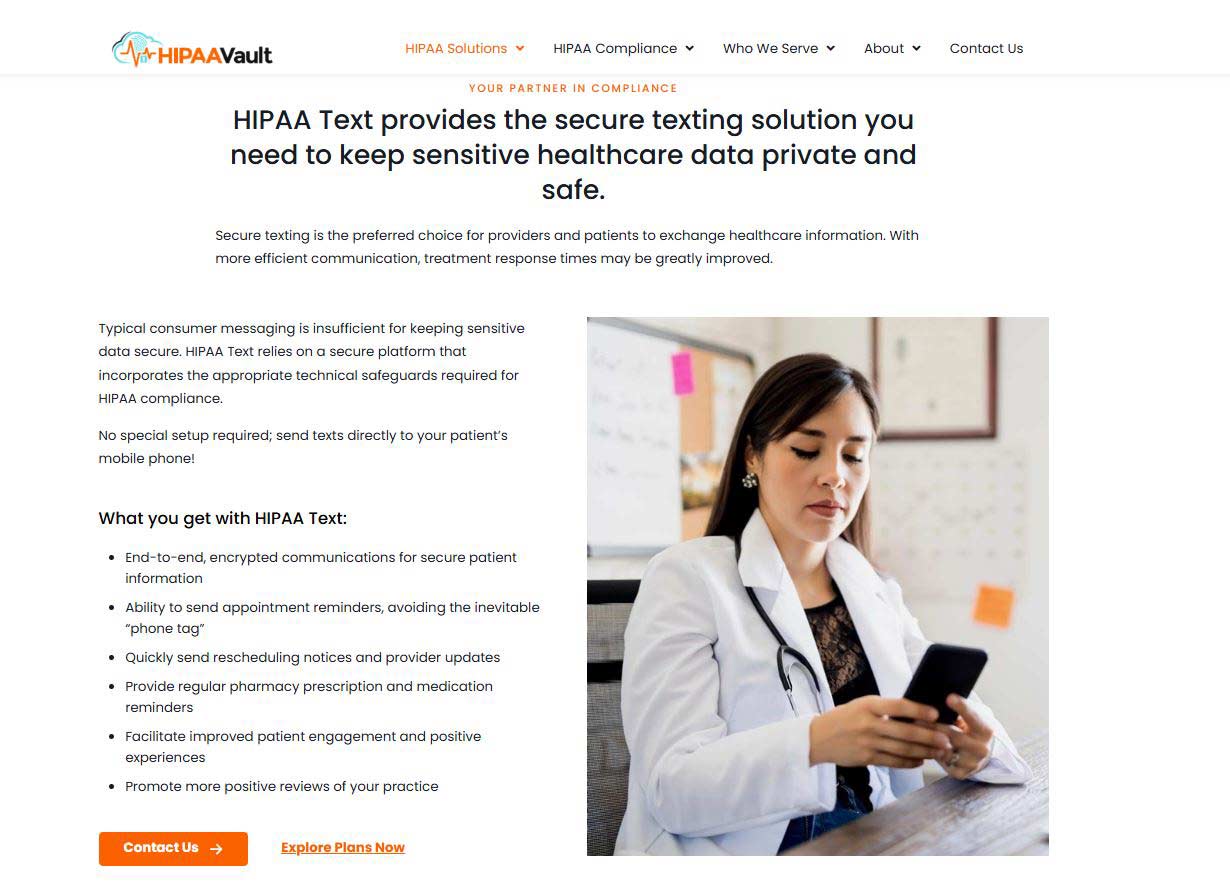

Summary of Benefits
- Improved Communication Efficiency: Enables fast and convenient communication between healthcare professionals, patients, and staff.
- Secure and Encrypted Messaging: Protects sensitive patient information from unauthorized access or breaches during transmission.
- Regulatory Compliance: Ensures healthcare organizations meet HIPAA standards, reducing the risk of legal liabilities and fines.
- Enhanced Patient Care: Facilitates quick decision-making and real-time updates, improving responsiveness and patient outcomes.
